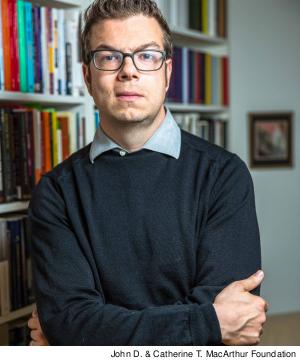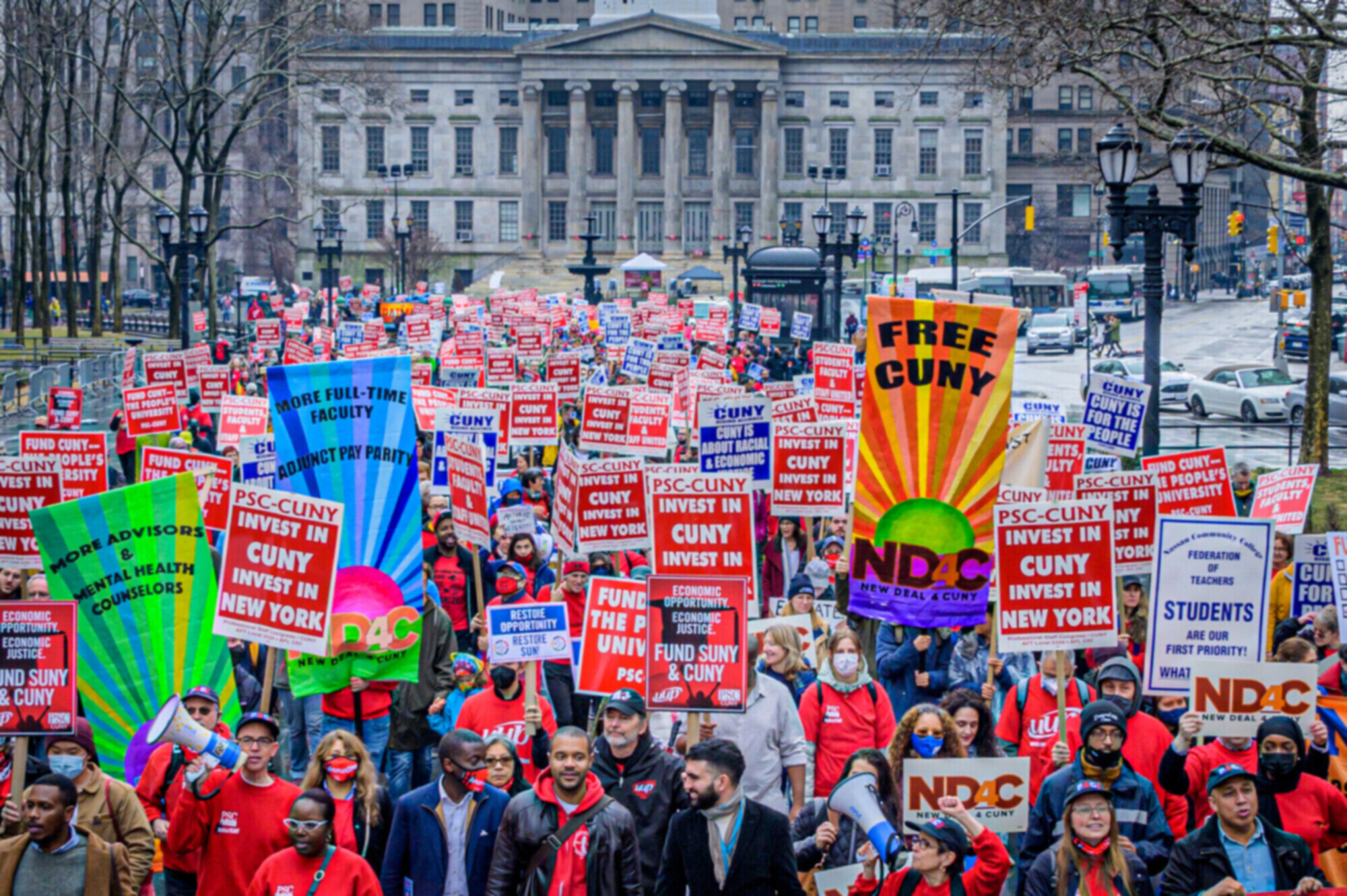Editor’s note: The novels and poems of Ben Lerner, professor of English at Brooklyn College and active member of his PSC chapter, have earned the praise of critics and spurred conversations about the intersection of art and politics. When released in September of last year, his novel 10:04 (Faber and Faber), which addresses both the Occupy movement and the aftermath of Hurricane Sandy, was described by The New York Times as “frequently brilliant.” His first novel, Leaving the Atocha Station (Coffee House, 2011), won The Believer Book Award and was named one of the best books of the year by The New Yorker and The Guardian, among many others. He is presently at work on a monograph titled the hatred of poetry, which will be published this June by Farrar, Straus and Giroux. In October, Lerner was awarded a MacArthur Fellowship.
 |
Clarion asked PSC Secretary Nivedita Majumdar, associate professor of English at John Jay College, to interview Lerner about how his view of poetry and fiction comports with the struggle for justice and fairness at CUNY in a climate of public disinvestment. Here we present their exchange, which was conducted via email.
NIVEDITA MAJUMDAR: You have related your poetic practice to Allen Grossman’s view that poetry is defined by a “bitter logic” because of a necessary disconnect between the “transcendent impulse” that motivates the poet and the material limitedness of the actual poem. Poetry in this sense is characterized by a failure or a betrayal. Do you see a similar process at work with the political impulse – the lofty idealism that often motivates radical politics and the meagerness of outcomes, if not even goals? Then again, much like the poet, does the political agent have any choice other than that of pressing on? Can you speak to this parallel, if you see it as one, especially in the context of an all-pervasive neoliberal logic?
BEN LERNER: I think the parallel your question suggests is real: that there always is, or at least always has been, a distance between a revolutionary or poetic impulse and what is actually achieved. But you write and press on politically anyway, both because you have no choice and because the story isn’t as tragic as it sounds; the fact that a poetry or politics has to remain virtual in some sense just means that what is real is never identical to, never exhaustive of, the possible. I also think the energies opened up in the act of composition – like the energies released in the process of political struggle – are real and unpredictable forces that are not limited to what an artist or political agent intended to achieve. More generally, setting aside the logic of “bitterness” – which is sometimes a useful way to talk about art and sometimes not – I think that “neoliberal logic” is largely the logic that there is no measure of value but price. And art and political experiment are, to my mind, committed to seeking out other ways of valuing and measuring value. So there is that fundamental affinity.
NM: Your novels portray a certain alienation from the idea of collective action in young people preoccupied with private lives and aligning with only a kind of lifestyle politics. And yet, you also document the Occupy movement, which unsettled not just institutional structures but key moments in the lives of your characters. How do you understand the coexistence of these seemingly contradictory impulses in contemporary youth? Could you maybe talk, in particular, about how you see CUNY students negotiating the pulls of the personal and the political?
BL: Both of my novels — like many novels — are concerned with what would count as authentic experience (aesthetic, romantic, social) in conditions of spectacle. The novel as a form is great at portraying the threat of solipsism as well as glimmers of real social possibility. I should say that both of my novels have narrators of significant privilege (in terms, for starters, of race and class), who are trying to figure out what it would mean to be an artist or father or friend or political agent from those positions without lapsing into ironic detachment. That’s not everybody’s problem, obviously. But generally, I think atomization and interconnection are very close to one another in a globalized economy of bundled debt, “social media,” etc.
I suppose I see CUNY students trying to figure out how bad forms of collectivity (being denied X) can be transformed into a good form of collectivity (joining together to fight for X and then make claims beyond it). One of the weird things art can do is make us feel the potential for good collectivity in even its most perverted forms.
NM: As you know, we’re now at a critical juncture in our contract campaign. Like public institutions across the country, we’re under attack by forces that want to deny the right to quality education to working-class communities. A key aspect of the attempt to eviscerate the worth of public education was also reflected for us in the Pathways Initiative. It basically sent the message to our students that they are not worthy of a well-rounded liberal arts education, that a vocational education is good enough for them. As a highly accomplished writer, your work with CUNY students challenges that message. Could you speak to the significance of teaching poetry and creative writing to working-class, largely minority students?
BL: I should say first that my teaching at Brooklyn is primarily — but not exclusively — in a graduate writing program that is not largely [composed of] minority students. (Making our program more diverse is and should be a critical priority.) But I also teach and advise undergraduates whenever I have the chance. In my experience, CUNY undergraduates are polyglot, brilliant, tough, generous, open-minded and remarkably resilient. (I have students working so much to support their education and their family that it is unclear to me how they do it all, exactly; of course, some of them ultimately can’t. There’s just a limit to how many minimum-wage jobs you can work while also trying to do your reading.)
Talking about language and literature with such students is my privilege and I feel like much of my teaching is about bringing out what they already know so deeply: that language and power are inseparable, that structure (political or poetic) is inseparable from how we experience sense, that the social world is built, to a large degree, from words. I also think that part of my job is to remind them what is, by rights, already theirs: the city and city colleges. A poetry and a creative writing class is in part about the power of naming. The divestiture from all things public, the privatization of everything, is violence, is theft, and should be named thusly.

